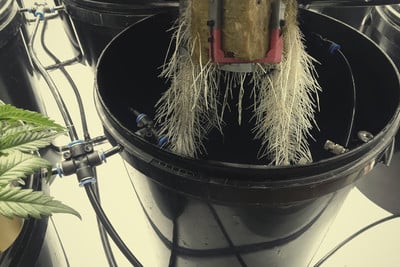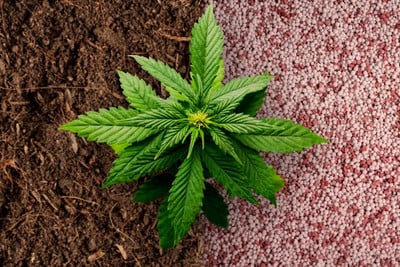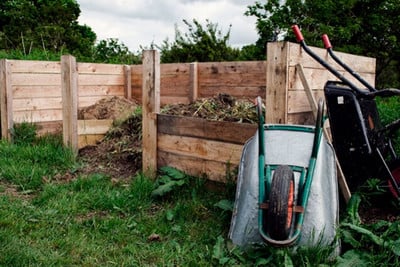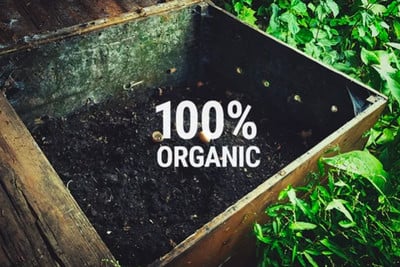.

How Enzymes Help Cannabis Plants Survive and Thrive
Your cannabis plants would perform much worse and provide much less if it wasn't for the action of enzymes. We take a look at what they do and how they can benefit your grow-up, regardless of whether you prefer to grow in soil or hydro.
Discover everything you need to know about enzymes, a fundamental part of cannabis growing.
Contents:
Enzymes exist all around us—inside the human body, other animals, and, most importantly for cannabis growers, inside plants and soil. Usually, these enzymes work behind the scenes, but it's entirely possible to encourage enzymatic action with organic matter and homemade solutions. For cannabis growers, enzymes present some significant benefits to plant vigour, health, and nutrient uptake.
What Are Enzymes?
Before we dive headfirst into how, exactly, enzymes can benefit cannabis plants, it helps to understand a little about what these microscopic proteins do. Essentially, enzymes facilitate chemical reactions. They do so by binding with a substrate and forming or breaking molecular bonds. In this context, the substrate is the molecule upon which an enzyme acts in order to boost the efficiency of a reaction.
Enzymes are proteins with complex 3D shapes that feature regions called active sites. When the substrate binds to these active sites, it forms an enzyme-substrate complex that causes a chemical reaction to take place, temporarily changing the structure of the enzyme and ultimately causing molecules to either come together or break apart. As a result, molecular products are released, and the enzyme returns to its original shape.
Specific enzymes are capable of binding with certain substrates, as the substrate fits into the active site more or less via a lock-and-key principle. Although, new research suggests a more accurate theory of "induced fit", in which enzymes and substrates undergo structural changes to facilitate the reaction.
If you take the human body as an example, we have an abundance of enzymes in our saliva and digestive system. These molecules bind with substrates in these regions (food particles), working to break down the food we eat into usable parts before converting them to energy.
Cannabis and Enzymes
Enzymes in cannabis work in a similar way to the example highlighted above. Typically, enzymes occur in soil naturally, but if your soil mix is lacking organic material[1], or you're growing hydroponically, then adding enzymes directly to the substrate is crucial.
By using them in cannabis growing, enzymes not only help break down essential nutrients into smaller, more readily available pieces, but they support the digestion of dead root cells, clearing a direct path for nutrients.
Overall, enzymes make it easier for your cannabis plants to absorb all the elements they need to reach their full potential. For growers, a plant that reaches its full potential means a bucketload of juicy buds come harvest.
Common plant enzymes include:
- Cellulase
- Xylanase
- Beta-glucosidase
- Hemicellulase
- Amidase

What Are the Benefits of Enzymes for Growing Cannabis
Supplementation with enzymes can benefit cannabis plants in the following ways:
- Healthier root system
Enzymes digest excess organic materials, deterring harmful bacteria[2] and pests around the root system.
- Allows you to reuse substrate
With the right enzymatic solution, growers can cleanse substrates (soil, coco, etc.), effectively recycling the mix for future grows.
- Improved nutrient uptake
Enzymes break larger nutrient molecules into smaller, more readily usable parts. With a healthier root system overall, cannabis plants are more efficient at cycling the nutrients they need.
- Faster growth
A healthier root system combined with improved nutrient uptake means your cannabis can shift its focus towards growth and development above the surface.
- Enhanced yield
Enzymes are perpetual, meaning they will perform their role as long as there's a chemical or compound to interact with. Combined with other supplements, such as molasses, it's possible to encourage a healthy enzyme culture all the way to harvest, boosting yields as a result.
What's the Link Between Enzymes, Molasses, Chelation, and Amino Acids?
To take full advantage of enzymes, you can pair them with other supplements and micronutrients to effectively supercharge their potential. Below are several plant-boosting additives that synergise incredibly well with enzymes.
-
Molasses
Molasses is an often overlooked supplement that can help improve and enrich soil while also acting as a natural insecticide. Molasses can be used throughout the vegetative and flowering stages, making it a valuable and straightforward ally for cannabis growers.
If that isn’t enough to make you try molasses in your next cannabis grow-op, the supplement is also an excellent food source for microorganisms. And more microorganisms means more enzymes.

-
Chelated Minerals
Chelated minerals are more soluble than their inorganic form, making them a useful tool for feeding hungry cannabis plants. You can pump the soil full of chelated micronutrients until the cows come home, but unless your plants can easily absorb what they need, you'll end up doing more harm than good. Enzymes are the perfect companion to chelated minerals because they improve overall root efficiency, making better use of the elements at hand.

-
Amino Acids
Finally, we have amino acids, another building block of optimal plant nutrition. Amino acid fertilisers are common among growers who want to push the limits of floral growth and resin production. Amino acids are important as they’re a major component of protein synthesis, in turn supporting cellular strength, stimulating metabolic processes, and, of course, transporting nutrients. The synergy between amino acids and efficiency-boosting enzymes makes them a powerful pairing.


How to Make an Enzyme Solution for Cannabis
Now that we know precisely how cannabis plants benefit from enzymes; it's time to implement them. If, however, you've taken the time to ensure a natural soil mix rich in organic matter, then adding an enzyme solution to the equation isn't really needed.
That being said, you can give your enzyme culture a boost with our homemade recipe. Enzymes won't disappear or break down, but you can bolster their numbers with the right supplements.
Ingredients
- Molasses
- Fresh vegetables (scraps or peels also work)
- Fresh water
Equipment
- 2x plastic container (with lid)
- Measuring jug
Steps
- With your ingredients in hand, blend them in one of the plastic containers. Make sure you add them according to the following ratio, 1:3:10 (molasses to fresh vegetables to fresh water).
- Close the container, ensuring the seal is airtight. You don't want your solution to become contaminated.
- Leave the plastic container in a dark, cool, and dry location for up to 3 months. Once a week, open your container to release the gases that occur during fermentation.
- You'll know your enzyme solution is ready when it's dark brown with a vinegary smell. Filter off the liquid into another container—this is your homemade enzyme solution. You can then either discard the leftover organic waste or use it as a bonus fertiliser.
How to Apply an Enzyme Solution to Cannabis Plants
Applying an enzyme solution is simple, but there are essential differences between soil and hydroponic setups.
-
Soil
To make the most of your homemade enzyme solution, you'll want to apply it directly to the soil. You can use it as a foliar spray, but it won't be nearly as effective. Remember, the enzymes we're interested in reside in the soil around your plant's root system.
For best results, ensure the soil surrounding your plants is moist throughout—don't skimp on watering. Just ensure that, no matter how much enzymatic solution you make, you either keep to the ratio outlined above, or, if you're using an off-the-shelf option, stick to the manufacturer guidelines.

-
Hydroponics
With hydroponic systems, there isn't an organic soil for your enzymes to flourish in. In fact, it's the lack of natural microbial action that makes an enzyme solution essential for hydroponic plant health.
However, because you'll be applying enzyme solutions directly to your reservoir, we can't give guidance on optimal ratios. It depends on your hydro setup, level of oxygenation, and your current feeding programme.
What we can say is that you'll want more concentrated solutions compared to a soil grow. To do that, you'll need to stick to manufactured enzymes solutions, rather than homemade recipes.
Start your plants early, adding in the manufacturer-recommended ratio each time you feed. It's much easier to keep healthy plants healthy than it is to rectify a hydro system that's thick with slime due to a lack of microbial action.


Factors That Affect Enzymes
The final consideration for cannabis growers is making sure conditions are optimal to support optimal enzyme action. It's no good spending time researching the benefits of enzymes if you don't create and maintain the environment they need to thrive.
- pH
Thankfully, enzymes are resilient little proteins, but they aren't indestructible. Most plant enzymes can tolerate a pH of 6.0–8.0, which also happens to include the optimal range for cannabis (6.0–7.0 in soil; 5.5–6.5 in hydro). Just ensure the pH of your substrate is balanced before you apply any enzyme solutions.
- Temperature
Natural fluctuations in temperature aren't going to destroy your plant's enzyme population, but excessive or prolonged heat can. If you make a homemade solution, keep it away from direct sunlight.
- Timing
The best time to use enzymes in cannabis growing is as plants enter flowering. It takes time for the microbial population to build, so it's no good adding enzymes just as you're about to harvest. Once your cannabis plants reach this pivotal stage, add enzymes as part of your usual feeding routine.
Enzymes for Cannabis: Do You Need Them?
Enzymes are an integral part of cannabis cultivation, whether you're growing in soil or hydro. Fortunately, if you're using a soil substrate, you're already halfway to a healthy enzyme population. That is, of course, provided your soil mix is full of organic matter. If it isn't, an enzyme-rich solution works wonders to improve the efficiency of your plant's root system.
For hydroponic cannabis growers, enzyme supplementation is paramount. Without their help, systems can quickly become clogged, starving your plants of the essential nutrients they need. These microscopic proteins encourage several benefits, making them a potent ally to cannabis growers of all skill levels.
- Application Rates of Organic Fertilizer on Soil Enzyme https://www.researchgate.net
- Microbial Enzymes as Control Agents of Diseases and Pests https://www.sciencedirect.com










































